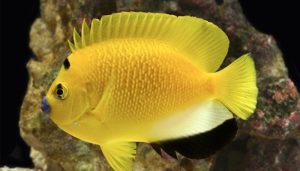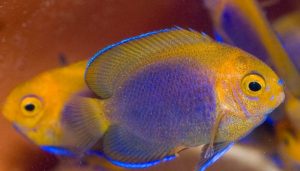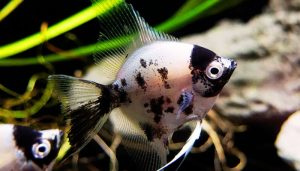How to Tell If Your Betta Fish Is Unhappy? Have you noticed your betta fish acting differently—less active, refusing food, or hiding more than usual? Just like any pet, bettas show signs of distress when something isn’t right, and knowing these warning signs is crucial to keeping them healthy and happy.
Lethargy, faded colors, clamped fins, and a loss of appetite are all common indicators that your betta might be unhappy.
Poor water conditions, lack of stimulation, or even loneliness can contribute to their stress.
Fortunately, with the right care, adjustments to their environment, and proper nutrition, you can bring your unhappy betta fish back to a thriving state.
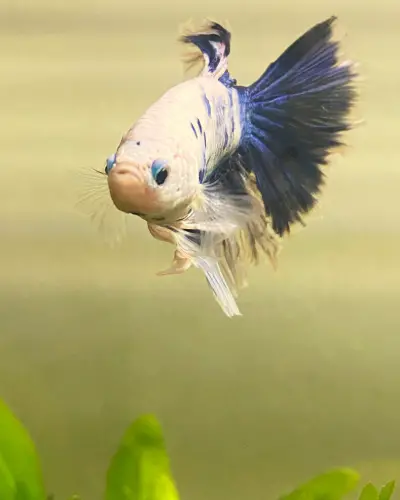
But these aren’t the only signs you should watch for. Experts like Dr. Stephanie Pate, an aquatic veterinarian, emphasize the importance of recognizing behavioral changes early. So, let’s dive into the key warning signs of unhappy fish and the best ways to fix them!
Table of Contents
ToggleUnderstanding Betta Fish Depression:
Can betta fish get depressed? Betta fish can experience a form of depression, often manifesting in lethargy and a lack of vibrant color. When bettas are unhappy, they may stay at the bottom of the tank or hide in corners instead of swimming around energetically.
This behavior is a clear signal that your betta is not thriving in its environment. Various factors contribute to betta fish depression, including inadequate tank size, poor water quality, and lack of enrichment.
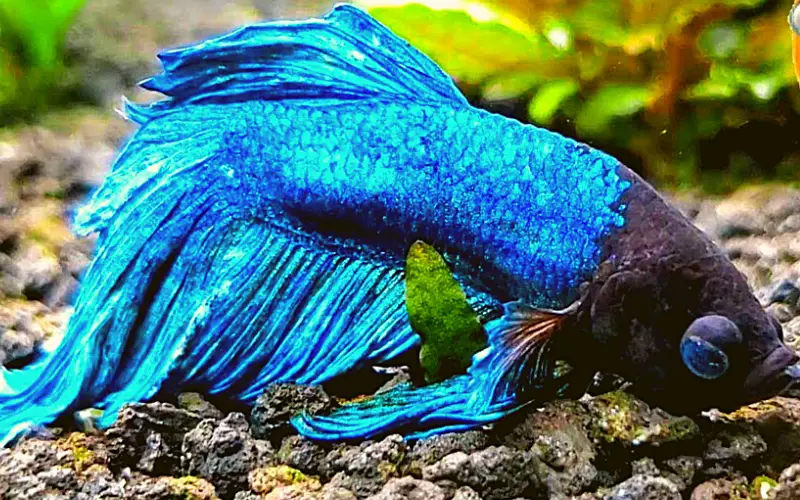
A good sign of a happy betta is when it swims around confidently, displaying a healthy appetite and engaging in natural behaviors like flaring or building bubble nests.
Additionally, monitoring your betta’s physical condition is essential. If you notice that your betta is less interactive or its fins are clamped, it may indicate stress. Environmental factors, such as the presence of a filter or heater, should be adjusted to ensure optimal living conditions.
Providing plenty of hiding spots and plants can also help create a more stimulating environment. Ensuring your betta fish has a comfortable habitat will promote overall well-being and prevent signs of stress.
How to Tell If Your Betta Fish Is Unhappy?
How can you tell if a betta fish is happy? There are several signs to help you determine if your betta fish is unhappy. One of the first indicators is a change in appetite; if your betta is not eating its food, this may be a warning sign. Healthy bettas typically exhibit a healthy appetite, eagerly swimming to the surface at feeding time.
Another sign is the coloration of your betta; a vibrant color is usually a good sign, while faded or dull colors can indicate stress or illness. Monitoring your betta’s swimming behavior can also provide clues; if it appears lethargic and stays at the bottom of the tank, this can indicate discomfort.
It’s also important to observe the fin and gill movement of your betta. Happy bettas swim around gracefully with their fins fully extended, while stressed bettas may exhibit clamped fins.
If you suspect your betta is struggling, consider checking the water parameters, such as ammonia levels, which can greatly affect their health.
Regular maintenance of the tank and ensuring a clean environment can help mitigate these issues. By being vigilant and attentive to your betta’s behaviors, you can effectively tell if your betta fish is suffering from unhappiness.
6 Ways to Tell if a Betta Fish Is Stressed
Identifying stress in bettas is crucial for their health and happiness. Here are six ways to tell if your betta fish is stressed: first, observe their swimming patterns; if they swim erratically or hide, this may indicate distress.
Second, pay attention to their fins; clamped fins are a common sign of stress in bettas. Third, monitor their feeding habits; if your betta is not eating or shows a lack of interest in food, it can be a sign of unhappiness. Fourth, check the water quality in the tank; high levels of ammonia or poor filtration can lead to discomfort.
Fifth, consider the tank environment; lack of enrichment can lead to boredom and stress. Ensure your betta has plenty of tank decorations, plants, and places to hide. Lastly, look for signs of illness; symptoms such as spots or lesions can indicate more serious health issues, contributing to stress.
By taking proactive measures and ensuring a suitable environment, you can help your betta fish thrive and reduce the likelihood of stress. Creating a balanced ecosystem with the right filter, heater, and regular maintenance is essential for the overall well-being of your betta.
Healthy Betta Fish Vs Unhealthy
If you own a betta fish, knowing the difference between a healthy and unhealthy one is crucial for proper care. Here’s how to tell the difference between healthy vs unhealthy betta fish:
Signs of a Healthy Betta Fish
✅ Active and Alert – Swims energetically and responds to movement.
✅ Vibrant Colors – Bright and rich coloration, free from fading or discoloration.
✅ Smooth, Intact Fins – No rips, tears, or fraying in fins and tail.
✅ Clear Eyes – Not cloudy or bulging.
✅ Healthy Appetite – Eagerly eats food and does not spit it out.
✅ Gills Function Normally – No rapid breathing or labored gill movement.
✅ No Signs of Disease – Free of white spots, fungus, or bloating.
Signs of an Unhealthy Betta Fish
❌ Lethargic and Unresponsive – Stays at the bottom or hides often.
❌ Faded or Dull Colors – Loses vibrancy, indicating stress or illness.
❌ Damaged Fins – Torn, clamped, or frayed fins, possibly due to fin rot or stress.
❌ Cloudy or Bulging Eyes – Can indicate infection or poor water quality.
❌ Loss of Appetite – Refuses to eat or spits out food.
❌ Rapid Breathing or Gasping at Surface – A sign of stress, poor water quality, or illness.
❌ White Spots, Cotton-like Growths, or Bloating – Signs of ich, fungal infections, or swim bladder disease.
Conclusion
Maintaining the happiness and health of your betta fish requires vigilant observation and understanding of their needs. By recognizing the signs of stress in bettas, you can take actionable steps to improve their environment, ensuring they remain vibrant and active. Whether it’s adjusting tank conditions, enhancing their habitat with enrichment, or monitoring their feeding habits, your efforts can make a significant difference in your betta’s quality of life. Remember, a happy betta fish swims around confidently, displays vibrant colors, and engages in natural behaviors. Take the time to learn how to tell if your betta fish is happy, and enjoy the rewarding experience of being a betta owner.
You might also like
- 7 Warning Signs of a Dying Betta Fish You Need to Know
- Why Does My Betta Fish Make Bubbles? (5 Surprising Facts)
- How to Tell If Betta Is Stressed? (10 Signs of Happy Betta)
- Why Is My Betta Fish Turning White? (Symptoms & Curing Tips)
- A Closer Look at Betta Fish Behavior Before Death (Revealed)
- Betta Fish Care Guide: Everything You Need to Know! (FAQ)
- The Dark Side of Betta Nesting Bubbles (3 Risks Should Know)
- Is It Okay to Remove Betta Bubble Nest? Exploring the Pros & Cons
- White Spots on Betta Fish: 7 Effective Ways to Treat Ich!
- Can 2 Female Bettas Live Together: Discover the Truth
- 7 Reasons Betta Fish Flare Its Gills & (How to Handle It!)
- Male Vs Female Betta Fish: Key Differences (Which Is Better)
- How to Tell If Your Betta Fish Is Happy: (7 Telltale Signs)
- Do Betta Fish Bites Hurt: Teeth & Tendencies Explained!


